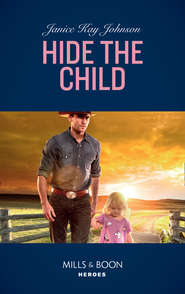По всем вопросам обращайтесь на: info@litportal.ru
(©) 2003-2024.
✖
Bringing Maddie Home
Автор
Год написания книги
2019
Настройки чтения
Размер шрифта
Высота строк
Поля
But he couldn’t. He’d promised her. He’d known, watching her press herself back against her car while fighting abject terror, that the only way he could ever learn her story, ever bring her home, was to walk away and let her make the choice herself. If he’d tried to compel her, she would flee. She would hate him, and he didn’t want Maddie Dubeau to hate him.
And also...seeing how afraid she was, Colin had to ask himself why. Twelve years later, and she was petrified because someone from her past had recognized her? Did she have a good reason? Would he be endangering her if he brought her into the open?
A part of him was thinking he should do just that. His conscience was scraped raw. What if he came face-to-face with her father? It was bad enough not telling Duane. Colin didn’t think he could look Marc Dubeau in the eye, knowing what he did.
No, he thought. He had to keep his promise. He’d leave Maddie’s photo where it hung in his office and hope that someday his cell phone rang and he would hear her voice.
“I’ve always believed she’s alive,” he said abruptly. “Don’t ask me why, but I still do.”
The older man stared hard at him. “You’ve never said that before.”
“Are you going to tell me I’m dreaming?”
Duane gave a short bark of laughter, then rubbed a hand over his face. “No. You’ve got good instincts. You always did. I hope you’re right, Colin. I hope you’re right.”
Colin waved at the scene around them. “Bring me up-to-date.”
* * *
NELL GAVE SERIOUS thought to disappearing again. She went so far as to pack a couple of her suitcases so they were ready for her to grab at a minute’s notice.
A voice of reason tried to quiet her panic. What had been dangerous to her teenage self might not be a threat to the adult she was now. It might even be that she’d spent all these years afraid of the wrong thing. This Captain McAllister said there was blood, a bike lying on its side. Someone had heard a scream. Maybe she’d had a perfectly good life before she was attacked. A family she loved.
But—reasonably or unreasonably—she didn’t think so.
Which still didn’t mean she had any reason to be afraid of the man and woman and boy she distantly remembered, now that she was grown up. It might only be that she’d thought they wouldn’t understand whatever trouble she’d been in. And she had, after all, been a teenager skewed to believe parents wouldn’t understand.
Irrational or not, panic made her stomach jittery. She hardly slept.
The next morning, she went straight to the bank and withdrew a couple thousand dollars.
Just in case. Better safe than sorry.
During the next two days, Nell made tentative, if probably ludicrous, plans. She spent the lunch hour of the first day wandering a cemetery in search of a grave marker for a child who would have been the right age if she’d lived. Whose name she could steal. She stood staring down at one such marker, an infant who had died at three days old, when she thought, Oh, that would be brilliant. Jeez. If she picked someone who’d been born and died here in King County, right where Eleanor Smith would have to disappear, she might as well draw a big red arrow for anyone searching for her. This way.
Walking back to her car across the springy, wet grass, she gusted a sigh. Assuming an identity wasn’t easy these days. The internet and shared databases made both hiding and appearing anew harder than it used to be. Harder, even, than twelve years ago. Plus, she’d have to start all over again, maybe give up her dream of graduate school, and she didn’t know if she had that in her.
What she didn’t do, not right away, was look up Madeline Dubeau on the internet. A part of her knew she didn’t have to, had known the moment he’d said the name that she was Maddie. Whatever was wrong with her wasn’t complete amnesia, the kind that made a man stumble into the emergency room at the hospital and say, “I don’t know who I am.” She did have memories, some clear as if they happened yesterday, tactile and real, while others were misty, barely seen.
She simply knew, had always known, that she didn’t want those memories to clear. The terrified, unthinking creature she’d been had held one certainty: her only hope was not to go back. Not to be who she was.
She wished now she had kept running, not stopped so soon. This policeman wouldn’t have stumbled on her if she lived in Maine or Florida. Back then, though, she hadn’t known where was safest because she didn’t know where she was from. How could she guess, when she had no idea how long she’d been in that car trunk before she became lucid?
She had come to think of her escape that night as her birthing story. The car trunk was her womb. Except a womb was supposed to be a safe place, nestled beneath a mother’s heart. Babies were forced out of the womb when the time came, crying their reluctance, only to be met with welcoming arms. They didn’t flee in terror into the night, grateful for the lash of tree branches, the scrape of bark.
If she had to start over again now, it wouldn’t be quite the same, of course; at least this time she’d retain her history and sense of self. But it would be a rebirth, nonetheless. Too close to what she’d already had to do once. And...impractical. She’d been reacting like a terrified kid, not the adult she was now.
She could call up newspaper clippings and read about Maddie Dubeau. If seeing her own face in them, the faces of her parents or friends, brought back her memories, would that be so bad?
Alone in her apartment, Nell hugged herself with intense anxiety, trying to reason with a bone-deep terror that felt as primal as mankind’s instinctive fear of fire or snakes or the dark.
I like my life. Why would I want to know where I came from?
Because, she admitted. Because she was lonely, and as things stood she didn’t dare let anyone close enough to have the right to expect answers. Because she felt hollow when she was with a group of friends, like her readers’ club, and they shared stories of their childhoods and families until she could see whole tapestries spread out, with rich colors and details so fine they made her heart hurt. Because she would like children of her own, if only she knew why the kind of trust a marriage took was impossible for her.
Because she hated being afraid of something she couldn’t even remember.
The next day, Nell went online and, first, did a search for the policeman who had confronted her in the parking lot. Captain Colin McAllister. It was reassuring when his name popped up immediately with dozens of references. Mostly in central Oregon newspapers, but a few times in the Oregonian, Portland’s daily. She randomly clicked on sites and read about testimonies in court, press conferences, promotions. The article in the Angel Butte Reporter about his promotion to captain of the Investigation and Support Services Division had a photo of him in uniform, gazing gravely at the camera. His eyes were hooded, watchful. They were gray, she decided, peering so closely her nose was almost pressed to the monitor. He wasn’t smiling, and his brows were knit together a little, adding a couple of creases to his forehead. And yes, he definitely had that remote look she was used to seeing in cops who came by SafeHold.
Not sure why she did, Nell printed the picture. Maybe if she kept studying his face she could decide if he was trustworthy.
Finally, pulse racing, she typed Madeline Noelle Dubeau into the search engine and, after a shaky moment, hit Enter. There were bunches of articles, not just in the Angel Butte paper but also in the Oregonian and even the Seattle Times. She chose one in the Portland Oregonian, and was unexpectedly stunned to see her face. She saw the date, and realized how lucky she’d been not to be recognized. She’d been in Portland by then, as naive and, in truth, almost as helpless as a newborn, trying to figure out how to survive while also staying invisible.
Now, she thought in bemusement, I know how old I really am. She’d been close, but was a year older than she’d thought.
The article summed up the history. Her history. It was assumed that fifteen-year-old Maddie had been abducted, leaving behind her mountain bike, her wallet and blood that DNA testing confirmed was hers. Her parents had thought she was upstairs in her bedroom when she had instead been riding her bike through a wooded section of park. The best guess was that she was on her way to a friend’s house in a neighborhood beyond the park. The friend, Emily Henson, hadn’t expected Maddie. Investigators had declined to share any leads police might be pursuing.
Nell read hungrily, article after article. There were her parents. Her father, Marc Dubeau, owned a major resort and had, at the time, sat on the city council. A lean, dark-haired and dark-eyed man, he looked like he might be as French as the name. He was handsome, and she couldn’t see herself in him at all. Her mother was always in the background in photos, either grief or personality making her retreat inside herself so that her face was expressionless, her wide eyes seeing something that wasn’t in front of her. She was blonde and blue-eyed, but aside from coloring Nell looked strikingly like her. The triangular, almost catlike face with a broad sweep of cheekbones and sharp chin, the eyes that were almost too big for the rest of the face. The look came together more elegantly for Helen Dubeau than it did for Nell, whose hair was plain brown and who had somehow acquired freckles across her nose. But they were recognizably mother and daughter, a fact that left her staring and winded.
Yes, these were the people in her fragmentary memories. This was the woman she pictured waiting for her in the hall outside her classroom with other mothers. There were no photos of her brother, who’d been kept out of the public eye, but he was mentioned. Felix was three years younger than she was, a seventh grader that year.
She printed articles, photos, until there was a stack a quarter of an inch thick on her desk. When she was done and closed the browser, she put Captain McAllister’s photo on top, so that it was the one she was looking at.
Exhaustion swept over her. She ached, as if she’d been hauling heavy boxes all day, climbing endless flights of stairs. She barely summoned the energy to stumble to the bathroom and brush her teeth before she tumbled into bed. She fell into sleep as if it were the darkest depths of her forgotten past.
* * *
“WHAT KIND OF fiasco is this?” Bystrom snapped, stabbing the front page article in the Reporter with his finger. The Bend Bulletin lay beside it with a similar headline. “How the hell am I supposed to make us sound like anything but idiots when the mayor asks me about it?”
Colin and his counterpart, Brian Cooper, who headed Patrol Services, exchanged a fleeting, expressionless glance. Colin wished—man, he wished—he could dismiss Angel Butte Police Chief Gary Bystrom as the dumb shit he often sounded, but the SOB was more complex than that. Unfortunately.
He looked like the Hollywood version of a sheriff or police chief, the kind who’d risen through the ranks and now used hard-won wisdom and sometimes bitter experience to lead and inspire his officers. Blond hair had gracefully turned white; he wore a tan as if he’d spent a lifetime out in the field squinting against the sun. What creases and wrinkles his lean face bore made him more handsome. His tall, athletic body was still spare and showed the uniform to advantage. He liked to wear his uniform.
The tan, they all knew, came from the sun reflecting off snow and water. Bystrom was an ardent skier and fly fisherman both. Everyone in the department was grateful that he pursued his hobbies so passionately, because it kept him out of their hair more often than not.
What Bystrom was really good at was politicking. He and the former mayor, Pete Linarelli, had been best friends. Members of the city council strongly supported their police chief. He socialized with most of them, and with most of the important business people in Butte County, too. When Maddie Dubeau disappeared, he had frequently been pictured with her parents, his face reflecting his deep concern, a comforting hand on Helen’s arm.
Colin had checked out his background and knew he’d skated through ten years as a patrol officer, back when Angel Butte was a third the size it was now, a backwater not yet transformed into a tourist town with the resulting increase in crime. He’d served briefly as a community liaison, become an administrative sergeant and then, with stunning speed, lieutenant. He made captain by forty, chief by forty-five. He hadn’t served a day in Criminal Investigations, on the Drug Enforcement Team or the SWAT team.
Temper tantrums were his answer to screwups caused by inadequate manpower, training or weaponry. And yeah, Colin couldn’t argue; this was a big one. Also the kind Colin and Brian both had been expecting, had considered inevitable, given the budget cutbacks.
What happened, so far as Colin understood it, was that a detective on his way home from work had stopped at a Quik-Stop store for some diapers for his eighteen-month-old kid. He’d interrupted a holdup in progress and, though undoubtedly irritated because he’d now have to do paperwork rather than go home, had the perp facedown on the counter within seconds. Unfortunately, a rookie officer answering the original alarm then burst through the door and managed to shoot the detective despite the store clerk’s attempt to explain and the fact that the detective had yelled repeatedly, “I’m police! I’m police!” The wounded detective had to bring down the rookie and take his gun away, a wrestling bout that the robber had taken advantage of to escape.
The good part was that Andy Palmer, the detective, had taken the round in the fleshy part of his left arm and he was right-handed. The excusable part was a kid only five weeks out of the academy getting overexcited. Inexcusable? The fact that officers were spread so damn thin he’d been out on his own way too soon, with backup more than ten minutes away.
The chief didn’t want to hear any of that. He wanted to know what a detective had been doing pulling his gun without having his badge in his other hand. The diapers he’d been clutching were no excuse.
Colin ground his teeth.











